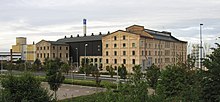Nils Persson
Nils Persson (* 1836 in Allerum , Skåne ; † 1916 ) was a Swedish entrepreneur and consul , he was a member of the Swedish parliament . The center of his entrepreneurial activity was the southern Swedish city of Helsingborg .
Life
Persson began his commercial career at the age of 15 in his aunt's shop. In 1860 he opened his own general store in Helsingborg and specialized in the import and sale of guano , which the farmers used as fertilizer . The business with it turned out to be extremely profitable and Persson soon looked at the possibility of making artificial fertilizers himself. In 1875 he finally founded Skånska superfosfat- och svalesyrefabriks AB (“ Skåne Superphosphate and Sulfuric Acid Factory Company ”), now part of the Finnish chemical group Kemira , in the Helsingborg district of Söder . To produce the fertilizer, he needed material containing phosphorus on the one hand, and sulfuric acid on the other . He initially obtained phosphorus from fossil mammalian bones, but later switched to importing rock phosphate from Florida and North Africa . He produced the sulfuric acid with the help of pebbles , which he mined in his own pits in Sulitjelma , Norway . The pyrites had a high copper content , which led him to found the Helsingborgs kopparverk AB copper works in 1886 following the sulfuric acid factory.
In Norway he also mined iron ore and founded several mines in um and Sulitjelma . In 1887 he founded Sulitelma gruber AB . Through his work he came to titles such as "Arch King of Norway" and many declarations of honor, but also had to accept the criticism that as a Swede he earned his money on Norwegian land.
In 1873 he founded Helsingborgs Ångtegelbruk AB in competition with the brickworks of the entrepreneur Petter Olsson . His "persategel" ("Persaziegel" based on his last name) were reddish brown in contrast to Olsson's yellow bricks. At that time you could see at the Helsingborg houses where which of the two gentlemen had his "territory". The strong economic boom in and around Helsingborg around this time created a great demand for the bricks, which were sold as far as Copenhagen in Denmark .
Persson was also involved in setting up other factories, including the sugar factory (Sockerbruket) in Helsingborg and Skromberga stenkols- och lerindustri AB in Ekeby , in collaboration with Petter Olsson .
From 1875 to 1903 Persson was Swedish Vice Consul in the Netherlands and from 1894 to 1909 consul in Germany. As consul, it was his job to safeguard Sweden's trade interests in the respective countries.
| personal data | |
|---|---|
| SURNAME | Persson, Nils |
| BRIEF DESCRIPTION | Swedish entrepreneur, member of the Reichstag and consul |
| DATE OF BIRTH | 1836 |
| PLACE OF BIRTH | Allerum , Sweden |
| DATE OF DEATH | 1916 |


